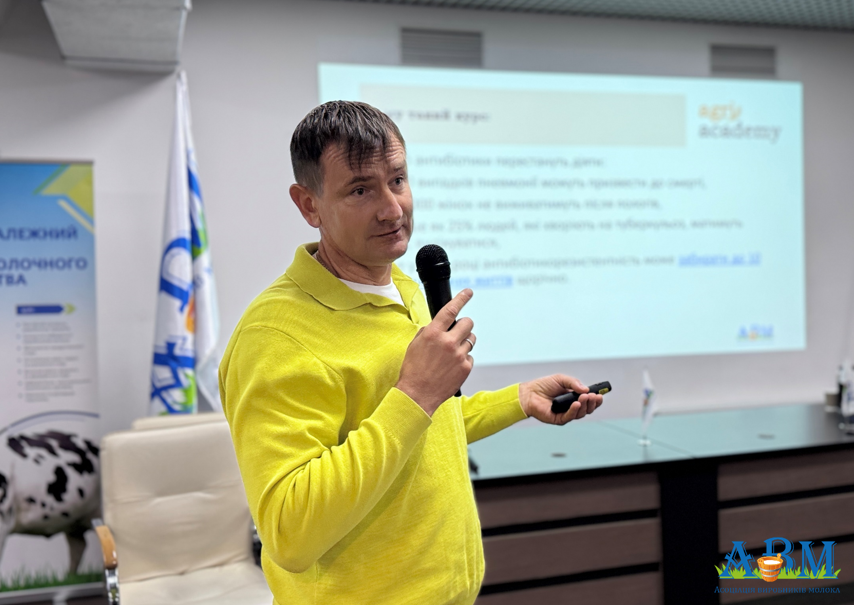In the conditions of war, Ukrainian dairy farms have faced a severe staffing shortage. Forced migration, employee mobilization, and reduced professional training opportunities have created serious challenges for the industry's development.
This was stated during the XVII International Dairy Congress by Valeriy Lototskyy, Associate Professor of the Department of Animal Reproductology at Bila Tserkva National Agrarian University, Head and Co-founder of the Asvisory Center of AMP and Veterinary Service Centers, AgriAcademy expert.
The International Dairy Congress, organized by the Association of Milk Producers (AMP), is the most influential event of the year in the dairy industry. This year, it united hundreds of leading industry representatives: producers, scientists, and businessmen to exchange experiences and latest achievements in the dairy business.
"Today, dairy farm managers are forced not only to maintain production but also to invest in staff knowledge to compensate for the personnel deficit and adapt operations to European requirements for animal welfare and product safety," the expert emphasized.
That is why a new certified online course, "Best Practices for Cattle Welfare and Responsible Use of Antibiotics to Prevent the Development of Antibiotic Resistance," is launching in November 2025 on the educational platform AgriAcademy.
Three Key Risk Periods and How to Control Them
The course author, Valeriy Lototskyy, notes that the training will help all levels of employees — from animal care operators to managers — understand where mistakes are most often made in keeping, comfort, and care of animals that increase the risks of disease and, consequently, the need for antimicrobial drug use.
"According to the National Research Center for Biosafety and Environmental Control of Agro-Industrial Complex Resources 'Biosafety-Center,' in over 45% of samples from dairy farms where E.coli was detected, the bacterium exhibited multi-resistance to antibiotics. This is an alarming signal indicating the incorrect use of antibiotic therapy at the enterprises," the expert emphasized.
Course Structure: Three Critical Stages
The program consists of three modules (5 lectures in each) that cover the key risk periods in cattle rearing:
- Transition Period of Cows — 21 days before and after calving: preparation for birth, prevention of postpartum diseases.
- Rearing Youngstock — from birth to 8 months, with a focus on the sensitive period up to two months of age.
- Lactation Period — mastitis prevention and treatment, analysis of production losses, udder health management.
"The course materials are structured to provide listeners with practical tools for assessing the herd's health status, calculating economic losses from errors, as well as clear criteria for preventing excessive antibiotic use and skillfully formulating their own treatment and prevention plan," stressed Valeriy Lototskyy.
AgriAcademy - A Free Platform Changing Agricultural Education.
AgriAcademy is a modern online platform for agribusiness, created in 2022 by the EBRD. It is a free online learning platform for agricultural sector employees and students of agrarian educational institutions, launched by the EBRD in December 2022 as part of the program to support food security in Ukraine. Its goal is to strengthen the competitiveness and sustainable development of agriculture, which has suffered significant losses due to the war.
Today, 28 online courses are available on the platform — over 300 hours of practical training in agronomy, management, technology, processing, storage, and more. Each course includes a knowledge check for listeners.
The creation and management of the platform (including course development, study tours, etc.) are supported and funded by the EBRD, as well as:
- The EBRD Multi-Donor Account for Ukraine Stabilization and Sustainable Growth (donors: Denmark, Finland, France, Germany, Italy, Japan, Netherlands, Norway, Poland, Sweden, Switzerland, United Kingdom, USA, and the European Union as the largest donor);
- The Republic of Ireland through the EBRD Small Business Fund (other fund donors: Italy, Japan, South Korea, Luxembourg, Norway, Sweden, Switzerland, Taipei China, and the USA);
- The Food and Agriculture Organization of the United Nations (FAO).
Today, the platform offers:
30+ online courses and over 300 hours of practical training;
- Topics ranging from agronomy and management to processing and storage technologies;
- Certificates upon course completion;
- Free access anytime for farmers, students, and specialists.
AgriAcademy is not just training. It is a response to the challenge facing the Ukrainian agricultural sector: how to preserve and develop human capital during wartime. Choose a course and grow with us!
A detailed announcement of the training course: "Best Practices for Cattle Welfare and Responsible Use of Antibiotics to Prevent the Development of Antibiotic Resistance" is available for download: Downloads/4_2_Lototskyi_AgriAcademy_corr.pdf
Press service of the Association of Milk Producers
Follow us on LinkedIn
Related News


